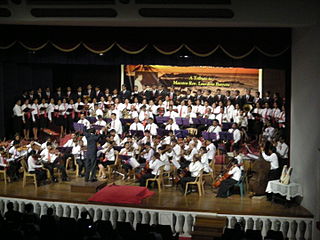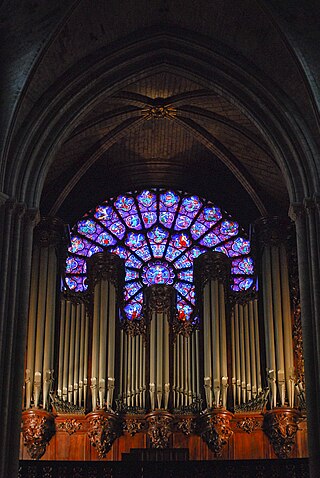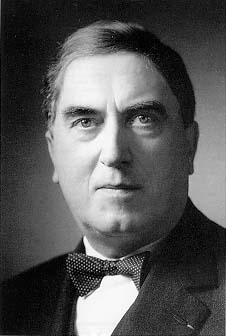Plainsong or plainchant is a body of chants used in the liturgies of the Western Church. When referring to the term plainsong, it is those sacred pieces that are composed in Latin text. Plainsong was the exclusive form of the Western Christian church music until the ninth century, and the introduction of polyphony.

An antiphon is a short chant in Christian ritual, sung as a refrain. The texts of antiphons are usually taken from the Psalms or Scripture, but may also be freely composed. Their form was favored by St Ambrose and they feature prominently in Ambrosian chant, but they are used widely in Gregorian chant as well. They may be used during Mass, for the Introit, the Offertory or the Communion. They may also be used in the Liturgy of the Hours, typically for Lauds or Vespers.

Vespers is a liturgy of evening prayer, one of the canonical hours in Catholic, Eastern Orthodox, Oriental Orthodox, and Lutheran liturgies. The word for this prayer time comes from the Latin vesper, meaning "evening".

Vespro della Beata Vergine, SV 206, is a musical setting by Claudio Monteverdi of the evening vespers on Marian feasts, scored for soloists, choirs, and orchestra. It is an ambitious work in scope and in its variety of style and scoring, and has a duration of around 90 minutes. Published in Venice as Sanctissimae Virgini Missa senis vocibus ac Vesperae pluribus decantandae, cum nonnullis sacris concentibus, ad Sacella sive Principum Cubicula accommodata, it is sometimes called Monteverdi's Vespers of 1610.
As the seat of the Papacy, the Vatican City and its predecessor, the Papal States, has played an important role in the development of Christian music. They perform chants of ancient origin, such as Gregorian chants, as well as modern polyphonic music. The papal choir is a well-known institution that dates back more than four hundred years. Singers were originally from northern Europe, but began arriving more from Spain and Italy in the 16th century. At this time, church authorities became concerned about the words of liturgical texts being drowned out by the traditional melodies. As a result, reformers like Palestrina revised the rules behind Gregorian chanting and Germanium, which were printed by the Medici Press in Rome; these reforms continued to be followed to the present day. A traditional musical instrument was the pipe organ. After the end of the Papal States, the Popes' ability to sponsor composers and musicians waned. However, it did not end entirely nor did interest in the subject. Pope Pius X and Pope Pius XII both wrote on the subject. In modern times, John Harbison and Gilbert Levine have composed or conducted for the Vatican. Although not of the Vatican, a Christmas concert where popular musicians performed had been held at the Vatican for thirteen years until ending in 2006. Notable performers at it included José Feliciano, Thelma Houston, Dionne Warwick, Gloria Gaynor, and B. B. King. The concert created controversy in 2003 due to statements by Lauryn Hill who used the opportunity to criticize the Vatican over Roman Catholic sex abuse cases.

The O Antiphons are Magnificat antiphons used at Vespers on the last seven days of Advent in Western Christian traditions. They likely date to sixth-century Italy, when Boethius refers to the text in The Consolation of Philosophy. They subsequently became one of the key musical features of the days leading up to Christmas.
"Carol of the Bells" is a popular Ukranian Christmas carol, which is based on the Ukrainian New Year's song "Shchedryk". The music for the carol comes from the song written by the Ukrainian composer Mykola Leontovych in 1914; the English-language lyrics were written in 1936 by Peter Wilhousky.

Marian hymns are Christian songs focused on Mary, mother of Jesus. They are used in devotional and liturgical services, particularly by the Roman Catholic, Eastern Orthodox, Oriental Orthodox, Anglican, and Lutheran churches.

The Basilica of the Sacred Heart in Notre Dame, Indiana, is a Catholic church on the campus of the University of Notre Dame, also serving as the mother church of the Congregation of Holy Cross (C.S.C.) in the United States. The neo-gothic church has 44 large stained glass windows and murals completed over a 17-year period by the Vatican painter Luigi Gregori. The basilica bell tower is 230 feet (70 m) high, making it the tallest university chapel in America. It is a contributing building in Notre Dame's historic district listed on the National Register of Historic Places. The basilica is a major tourist attraction in Northern Indiana, and is visited annually by more than 100,000 tourists.

A Ceremony of Carols, Op. 28 is an extended choral composition for Christmas by Benjamin Britten scored for three-part treble chorus, solo voices, and harp. The text, structured in eleven movements, is taken from The English Galaxy of Shorter Poems, edited by Gerald Bullett. It is principally in Middle English, with some Latin and Early Modern English. It was composed in 1942 on Britten's sea voyage from the United States to England.
St Mary's Cathedral Choir in Sydney is the oldest musical institution in Australia. In 1818 a group of choristers was formed to sing Vespers before the Blessed Sacrament in the Dempsey Household, the centre of Roman Catholic worship in Sydney as a penal colony. When St Mary's Cathedral, Sydney, was constructed, the successors of these choristers formed the Permanent Cathedral Choir under the guidance of Catherine Fitzpatrick.
Ambrosian chant is the liturgical plainchant repertory of the Ambrosian rite of the Roman Catholic Church, related to but distinct from Gregorian chant. It is primarily associated with the Archdiocese of Milan, and named after St. Ambrose much as Gregorian chant is named after Gregory the Great. It is the only surviving plainchant tradition besides the Gregorian to maintain the official sanction of the Roman Catholic Church.

"O come, O come, Emmanuel" is a Christian hymn for Advent, which is also often published in books of Christmas carols. The text was originally written in Latin. It is a metrical paraphrase of the O Antiphons, a series of plainchant antiphons attached to the Magnificat at Vespers over the final days before Christmas. The hymn has its origins over 1,200 years ago in monastic life in the 8th or 9th century. Seven days before Christmas Eve monasteries would sing the “O antiphons” in anticipation of Christmas Eve when the eighth antiphon, “O Virgo virginum” would be sung before and after Mary's canticle, the Magnificat. The Latin metrical form of the hymn was composed as early as the 12th century.

The Hunchback of Notre Dame is a musical with music by Alan Menken and lyrics by Stephen Schwartz. It is adapted from Walt Disney Animation Studios' 1996 film of the same name, which in turn was based on the 1831 novel of the same name by Victor Hugo. The musical premiered in 1999 in Berlin as Der Glöckner von Notre Dame, with a book by James Lapine. It was produced by Disney Theatrical Productions, being the company's first musical to premiere outside the United States. It ran for three years, becoming one of Berlin's longest-running musicals.

The Santa Cecilia Choir is a polyphonic male choir composed of seminarians of the Rachol Seminary of the Catholic Archdiocese of Goa and Daman in Goa, India.

Salve Regina is a composition for organ by Olivier Latry, a meditation of the Latin hymn "Salve Regina". Each of the seven movements reflects one line of the hymn which can optionally be sung in chant before the related movement. The work was first performed on 9 October 2007 by the composer at Notre Dame in Paris, recorded there and published by Gérard Billaudot.

Quatre Motets sur des thèmes grégoriens, Op. 10, are four sacred motets composed by Maurice Duruflé in 1960, based on Gregorian themes. He set Ubi caritas et amor, Tota pulchra es, Tu es Petrus and Tantum ergo.
J.J. Wright is an American composer, conductor, and piano player who currently serves as the director of the University of Notre Dame Folk Choir in South Bend, Indiana. He is the composer of O Emmanuel, a 2016 Adventide album that drew upon jazz and sacred music traditions and peaked at number 1 on the Billboard Traditional Classical Albums chart. Wright is a graduate of the University of Notre Dame, where he earned Master of Sacred Music and Doctor of Musical Arts degrees, and of The New School for Jazz and Contemporary Music, where he earned a Bachelor of Arts.












